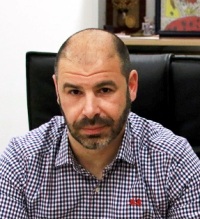“We have aspirations to become a multinational retail player” --Interview with the general manager of a sporting goods retailing company in Macedonia-- (1/2)
2017/9/22(Fri)10:00
(Macedonia/マケドニア)
*This interview article is divided into two parts and posted separately.
This is the first part of the article.
< Part 2>
Sport Vision Dooel Skopje
Mr. Igor Trpkovski (General Manager)
Macedonia
Many business people from abroad including the emerging countries have participated in AOTS training programs. Positions of the targeted audience vary with the programs, and there are some programs aimed for top executives.
We conducted an interview with a general manager of a company which retails, produces, and distributes sporting goods in the Balkan region.

--Please explain your company profile first.
--What aspects of corporate management do you put much value on? Please share with us your management philosophy or policy, or something considered important.
As we are attempting to reorganize from a mini-national to multinational corporation, the leading managers are central figures from two fundamental aspects. First, managers are expected to implement global programs, to distribute best practices and to align the organizational cultures of the headquarters and globally dispersed subsidiaries. Second, they have to adapt the management processes and practices in response to the cultural specifics of the host country. To achieve this, managers should acquire the depth of knowledge necessary to assist the company in managing myriad intercultural factors reflecting both global and local forces. In this case, intercultural competent, strategically localized executive managers address global-local tensions in everyday interactions, while at the same time confronting the difficulties of integrating geographically dispersed processes of sourcing, production and sales.
When subsidiary of MNC is directed top-down from the distant HQ, sometimes, because of the dynamics of retail business operations and constant time deficit, it is difficult to foresee all the aspects (or consequences) from a specific decision or action. In this case, the insights from the local staff are of utmost importance and should be considered by all means. Here, the country manager and his integrity are in the focus. He or she should take the responsibility to cease or proceed with a certain course of action, having in mind the interest of all stakeholders, delicately balancing between the global company strategy and local short-term performances. The popular “principal-agent problem” describes exactly these situations, where huge costs may arise from problems of moral hazard and conflict of interest. The higher interest of the company is above all, no matter if it causes conflicts with short-term key performance indicators. Again, the manager should find the way to relax the friction between the parties with different short and long-term interests and to secure smooth operations further.
I’m pretty sure that Japanese companies are experiencing the same dilemmas in their operations abroad. If not managed in a proper manner, the language, business ethics and cultural specifics and differences can put a significant pressure to international business operations.
The basic precondition is to recognize and promote a new breed of intercultural managers which are the essential economic agents for navigating cross-border activities in order to meet the challenges of competitive foreign markets. These world-class executives should successfully master the international challenge of balancing global integration with local responsiveness. By professional profile they are goal-oriented pace setters with high managerial, technological and innovation experience. So, again, people are the key. With the same importance as proper strategy, the success of the company in a new market depends largely on operational implementation and realization.
Considering the expansion in a broader context, early preparation and adoption of a proper entry strategy will minimize the risk in operations. Therefore, it is necessary to perform global scanning and obtain all the information necessary for exploiting the international opportunities. Still, the information scarcity may be attributable to the shortage of managerial resources and manifested with the absence of specialist executives to manage international operations. According to our experience, managerial expertise and competence, and the lack of information are the top two difficulties faced by the company in internationalization.
*This interview article is divided into two parts and posted separately.
It is the first part of the article.
< Part 2>
![The Association for Overseas Technical Cooperation and Sustainable Partnerships [AOTS]](/application/files/7615/7242/3141/logo-en.png)